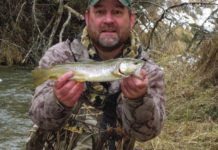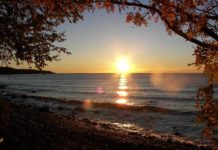Recently a letter was sent to the Massachusetts Joint Committee on Environment, Natural Resources and Agriculture by Linda Orel, Policy Director of the Trustees of Reservations. The letter speaks for itself:
“Our organizations respectfully offer testimony in support of S.546, An Act to Reimburse the Inland Fisheries and Game Fund, sponsored by Senator Anne Gobi. We are united by a commitment to conserve and restore the Commonwealth’s most critical natural resources, and we regularly work closely with the Division of Fisheries and Wildlife (MassWildlife) to protect and restore rare, threatened, and endangered species across Massachusetts.
MassWildlife is primarily funded through the sale of hunting, freshwater fishing, and trapping licenses, permits, and stamps, as well as dedicated federal funds from the Wildlife and Sport Fish Restoration program. A small remainder of MassWildlife’s annual budget comes from bond-funded initiatives, donations, and funds from the state’s annual operating budget. Unlike other state agencies, MassWildlife receives only a small percentage of its operational budget from general funds. All funds from freshwater fishing, hunting, and trapping licenses and dedicated federal funds go directly into the Inland Fish and Game Fund (hereafter, the Fund), which can only be used for administering programs by MassWildlife.
Despite a variety of funding sources that support MassWildlife’s work, the agency is chronically underfunded. Wildlife and habitat have always faced threats from development, fragmentation, pollution, and invasive species, and now climate change is heavily impacting ecosystems and natural areas, making MassWildlife’s work more important than ever.
Currently, the state reimburses the Fund for the loss in revenue from discounted hunting and fishing licenses offered to residents ages 65-69. However, the state does not reimburse the loss of revenue associated with free licenses offered to residents over age 70, which was approximately $1 million per year prior to the fee increase approved in 2021. Between 2022 and 2026, license fees will essentially double, meaning that by 2026, MassWildlife could be losing nearly $2 million in annual revenue if the status quo is to continue.
S.546 would annually reimburse the Inland Fisheries and Game Fund for all loss of revenue for any fishing or hunting license provided at a discount and for any license provided free of charge. This language would create consistency and require the state to reimburse MassWildlife for loss in revenue resulting from issuing free and reduced licenses – helping to restore taxpayer-supported funds to conserve and manage critical fish and wildlife habitat and plant species. Reimbursing these funds, as well as a more generous allocation from the General Fund, is part of the broader need to diversify funding for MassWildlife programs, which has been identified through MassWildlife’s assessment of fee increases.
We are grateful to the Legislature for adopting Senator Gobi’s amendment to the FY22 Operating Budget to reimburse the Fund for lost revenue attributed to the issuance of discounted or free hunting and fishing licenses. However, this language is included in a line item (2300-0100), rather than amending Section 11 of Chapter 131 of the Massachusetts General Laws, which governs the licenses and fees associated with the Inland Fisheries and Game Fund. We respectfully request that the Legislature make permanent the forward-thinking reimbursement they included in the FY22 budget by passing S.546, and therefore, updating Chapter 131.
The work of MassWildlife benefits all citizens of Massachusetts. MassWildlife’s Wildlife Management Areas and Wildlife Conservation Easements provide places for recreation and meditation; healthy ecosystems that ensure we have clean air and water and that sequester and store carbon; well-managed habitats that support our most imperiled species; and educational programs that inspire residents of all ages. The challenges of climate change and habitat degradation have made the work of MassWildlife critically urgent.”
The following were signers of that letter: Trustees of Reservations, The Nature Conservancy in Massachusetts, Berkshire County League of Sportsmen, Appalachian Mountain Club, Mass Association of Conservation Commissions, Environmental League of Massachusetts, Mass Conservation Alliance, Mass Audubon, Worcester County League of Sportsmen’s Clubs, Mass Land Trust Coalition, Mass Rivers Alliance and Massachusetts Council of Trout Unlimited.
Incidentally, the late George “Gige” Darey, Lenox resident and long-time Chairman of the MA Fish & Wildlife Board, spent many years working on forming a coalition of organizations such as those above. He knew that each one had its own set of priorities and many times they conflicted. But there were some things upon which they all agreed, such as open space and endangered species preservation. In those cases, it made perfect sense to join forces and establish a coalition. He called it his “Guns and Roses Coalition.” I’d bet he would be tickled pink to see all the signers of this letter.
Junior Duck Stamp art contest
There is still time to enter the Massachusetts Junior Duck Stamp (JDS) contest. Students from kindergarten through grade 12 can submit original artwork to participate in this fun and educational competition. The entry deadline is Feb. 15, 2022. The process of creating these works of art allows students to appreciate the importance of preserving wetland habitats and the delights and diversity of wildlife. Even if students do not enter the competition, science and art teachers will value the JDS curriculum as a useful resource, advises MassWildlife’s Wildlife Education Coordinator, Pam Landry.
The JDS program links the study of wetlands and waterfowl conservation with the creation of original artwork. Students learn about the habitat requirements of various kinds of ducks and geese and then express their knowledge of the beauty, diversity, and interdependence of these species artistically, by creating a drawing or painting which can be submitted to the JDS art contest. The art is judged in four age group categories in a statewide competition; the entry judged Best of Show moves on to represent Massachusetts in the national JDS competition. Art teachers, science teachers, and parents who home-school can visit the MassWildlife website for an information packet and entry information.
For more information contact Pam Landry at pam.landry@mass.gov.
If there are any local winners, I will gladly include their duck stamp pictures in this column.
Upcoming ice fishing derbies
The Coles Memorial Hard Water Fishing Derby is scheduled to take place on Goose Pond on Sunday, Jan. 30 from 7:00 a.m. to 2:00 p.m. Tickets are available on the ice near the boat ramp or in the office at Dresser Hull during normal business hours and must be purchased by 10:00 a.m. in order to fish. Tickets cost $10.00 for adults and free for kids 12 and under. There will be cash prizes for adults. All proceeds will go towards a memorial donation to the boat ramp in Evan Colbert’s name. Prizes and raffles will be held near the boat ramp at 2:00 p.m.
Event updates and more information can be found on Facebook at the Cole’s Memorial Hard Water Fishing Derby page.
The Lanesborough Fire Department will be sponsoring an ice fishing derby on Pontoosuc Lake on Jan. 29 from 6:00 a.m. to 2:00 p.m. It will be held behind the park on Narragansett Avenue. There is a $15 entry fee for adults, kids 12 and under free. The fee includes a chance at the door prize (Weber Grill), trophies for kids, refreshments and a raffle ticket drawing after the derby.
It might be wise to check on Friday to see if these derbies are still on.
Fly fishing show cancelled
Hopefully, fly fishing enthusiasts got the word of the cancellation and rescheduling of the fly fishing Show in Marlborough, MA. Originally scheduled for this weekend, it has been rescheduled to April 22 -24. Unfortunately, the announcement of the rescheduling came out too late for me to include it in last week’s column.
Donated lands
Recently, I have been receiving a number of requests to comment on a proposed bike track complex in a local municipal park. I decline to do so because I don’t believe it belongs in this column. That matter should be addressed and, if necessary, voted upon by an informed citizenry.
Generally speaking, my feeling is this: Unless there is a dire emergency or a public safety issue, I believe that when parcels of lands are donated and accepted with management stipulations, those stipulations should be adhered to. To do otherwise, (regardless of the passage of time), means the agreement has been reneged upon and could be considered a double-cross to the donors and their surviving families.
Credit: Source link































